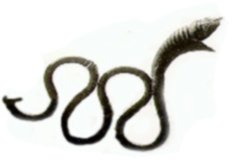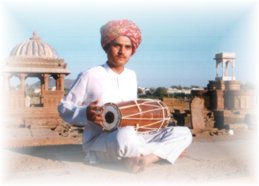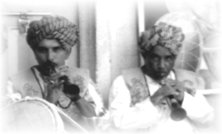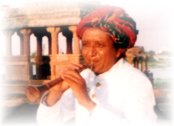|
In ancient times, people were playing the Nagara and dundubhi alone, but when the Nagara was associated with Sharnai, people started playing a pair of Nagara. In the pair of Nagara, one drum is smaller than the other and they are played with two sticks. Thus when a pair of Nagara accompanies the Sharnai, the whole set is called Naubat. In the medieval age, royal emperors and jagirdara were keeping such Naubat Khana and Naubat is played at different hours or times in various Hindu Temples.
The Nagara is generally played in wedding ceremonies, temples and in fortunate occasions. It is used in religious rituals and in the procession of temple deities.
Nagara is played by way of greeting at the function, on the occasion of Muharram, memorial the martyrdom of Imam Husain. The music played on this occasion is called Dhandh or Matam.
Nagfani:

The Nagfani is an commonplace curvy pipe made of brass or bronze. The shape of this pipe is like serpent. So it is known as Nagfani. It has got an integrated mouth-piece. Nagfani is played like Shrnga/conch-shell.
Nal:

Nal is used for addition with folk dancing and singing. The Nal is a long cylindrical two faced drum tape ring on one side. The ring head parchment, pasted with iron filling is mounted on the body and held by studs at both ends and fastened by rope. The left head is low pitched and is pasted from inside. The narrow head of the left side and its method of holding the parchment give the drum it's bright and clear tone.
Santar:
Santar is a prehistoric form of a Sitar played while chanting and singing folk lores, religious songs. It is also known as Ram Sagar.
Sharnai:

Sharnai is an old original double reeded instrument. In olden times, Sharnai or Shenai was also known as Karnai, Nafeeri, Tota. Sharnai is a variation of Surnai and these words Surnai, Karnai, Tota are of Persian origin meaning a trumpet, clarion or a bugle. The Sindhi Sharnai has little in common with these instruments except for a general semblance in form which gave it this name, but the Sindhi name has retained the original of the ancient Persian while elsewhere in the sub-continent it is known as Sharnai.
The body of the Sharnai is made from the wood of a very old Kirarr tree. Sharnai is of the medium size about eight inches long and it is basically the musical instrument of the Lower Indus Valley.

The Sharnai is used on ceremonial occasions and is considered as a propitious instrument or mangala – vadya. Sharnai is now played by the Langa Community – family of traditional music in Kutch in for years.
Sundari:
Sundari is a double reed wind instrument. It resembles the Sharnai in shape and construction, but it is shorter than the Sharnai. A Sundari has 7 to 9 holes made of shisam on lathe. The method of playing the Sundari is similar to that of playing the Sharnai. The other main difference is that Sundari is always played in medium and fast tempo; alap, gamaka, mind etc. of slow tempo are not possible in Sundari because it is a very short and tiny instrument, so most of the time, the raga (like Sohini, adana etc.) which are played in the notes of tara-saptaka are played on the Sundari.
Sumar Suleman Juma – 75 of Mundra in Kutch is believed to be an expert artist of Sundari. Sumar Juma is also an artist of Sharnai. He represented Kutch participating in the Festival of India held in France during 1985 for playing Sharnai. He accompanied his father late Suleman Juma – a master of Naubat. Sumar Juma is a grand artist of All India Radio, Bhuj for Sundari. His narration of Sundari is broadcasting over AIR occasionally. Sundari can be played with Naubat or Nagara and Tabla. Both folk and classical melodies can be recited over Sundari. You will enjoy sumarbhai while listening to his Sundari in various melodies like Kutchi Rag, Jogi, Marai, Suni, Ashavari, Vagheshwari, Bhimpalas, Malkosh, Natkedar, Sarangdesh etc.
|